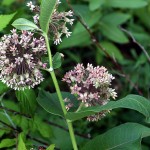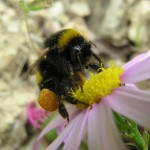by Catherine Haug, Feb 27/2014 ( photo, right, from Wikimedia Commons; photo, below, from Wikimedia Commons)
In addition to bees, we are also losing another valuable pollinator to the effects of GMO crops: the Monarch Butterfly. This beautiful animal feeds only upon milkweed in its youth, but the spraying of GMO crops with Roundup and other herbicides is killing off all the milkweed. You can help by growing this flowering plant in your yard or garden. See Monarch Watch: Growing Milkweed.
Don’t confuse the common milkweed with Asclepias tuberosa, also called butterfly weed, because it is listed as toxic. Asclepias tuberosa has erect, orange flowers and watery rather than milky sap. (See ces.ncsu.edu/depts/hort/consumer/poison/poison.htm for more about this).
Milkweed has medicinal use and is also used as a food. For example, young milkweed can be used much like spinach; the shoots can be cooked like asparagus, and the buds can be coated with beer batter, then deep-fried. See Maine Organic Farmers and Gardeners Association: Milkweed.
For more on a Healing Garden, see the original post A Healing Garden – for You and Bees.




